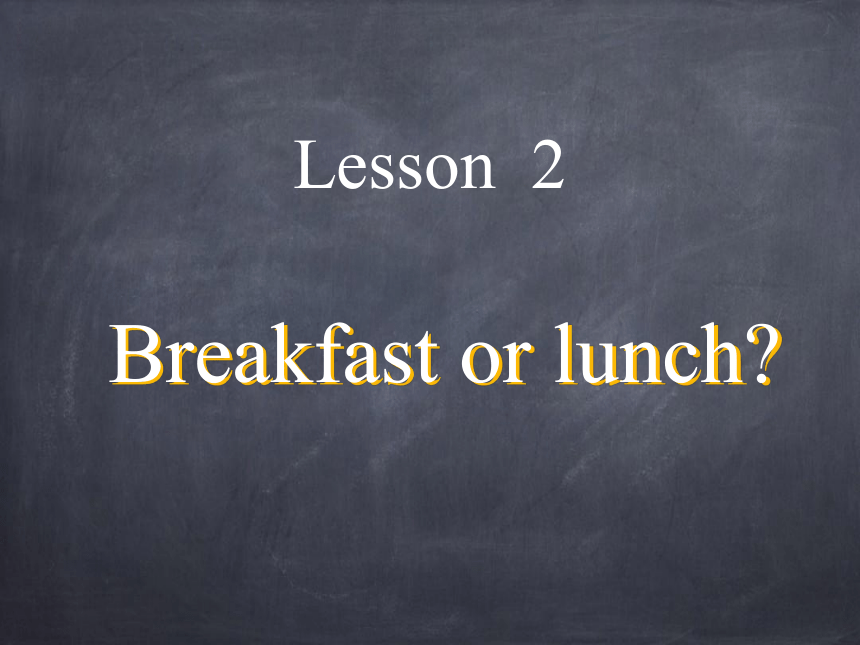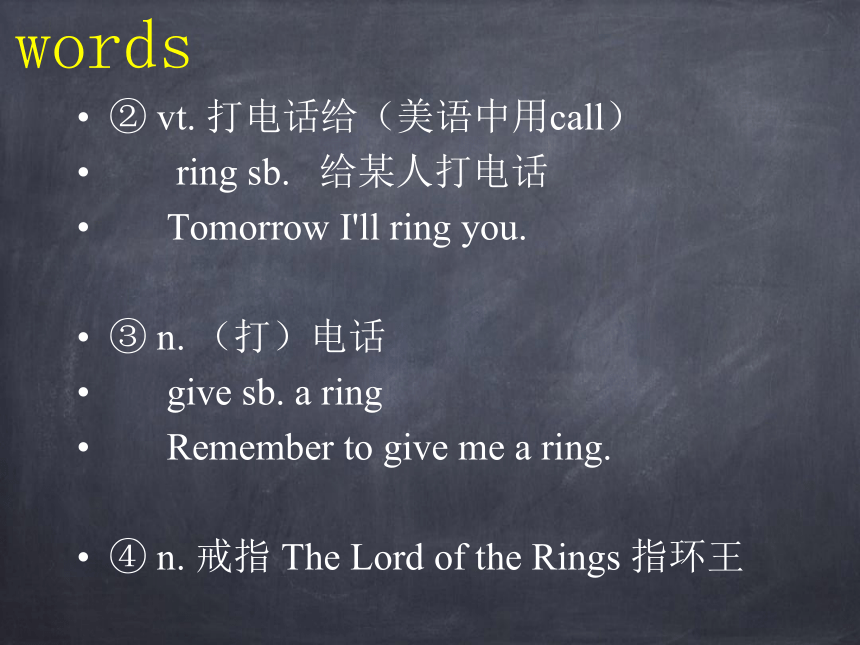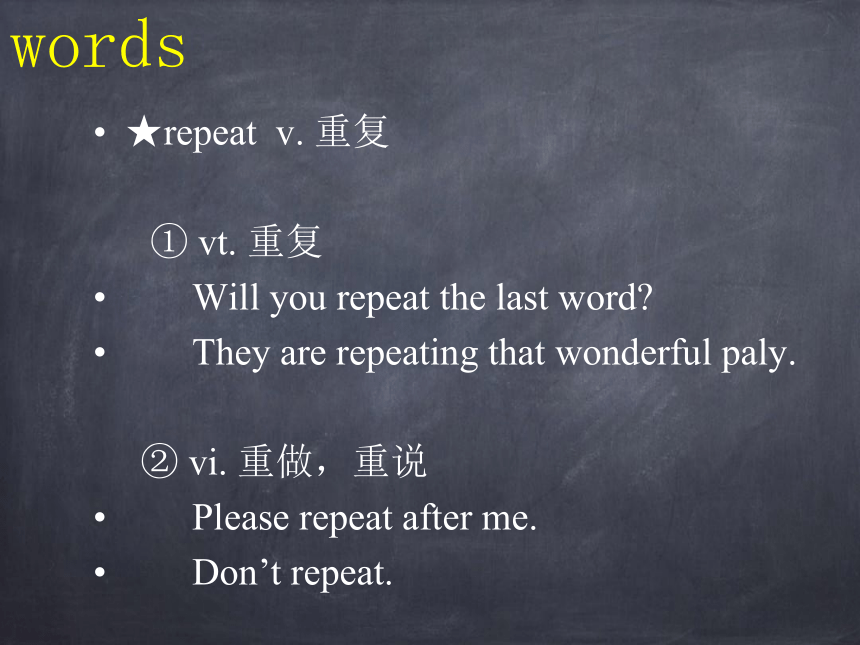新概念英语第二册Lesson2 Breakfast or lunch课件(共28张PPT)
文档属性
| 名称 | 新概念英语第二册Lesson2 Breakfast or lunch课件(共28张PPT) |  | |
| 格式 | pptx | ||
| 文件大小 | 3.9MB | ||
| 资源类型 | 教案 | ||
| 版本资源 | 新概念英语 | ||
| 科目 | 英语 | ||
| 更新时间 | 2025-01-02 10:46:36 | ||
图片预览









文档简介
(共28张PPT)
Breakfast or lunch
Lesson 2
words
★until prep.直到
until用于表示动作、状态等的持续,可译为
“一直到……为止”或“在……以前”。
在肯定句中,它与表示持续性状态的动词连用,
表示持续到某一时刻:
I’ll wait here until 8.
我会在这里等到8点钟。
在否定句中,它通常与描述短暂动作的动词连用,表示“到……为止”、“直到……才”:
She can not arrive until 6.
她到6点才能来。
His father didn't leave until he came back.
直到他回来,他爸爸才离开。
words
not…until…
★outside adv. 外面(作状语)
He is waiting for me outside.
It is cold outside.
words
★ring(rang. rung) v.(铃、电话等)响
① vt. 鸣,(铃、电话等)响
(这种响是刺耳的, 往往是提醒人做某事)
Every morning the clock rings at 6.
The telephone(door bell) is ringing.
而风铃等响要用jingle,jingle (bell) (铃儿) 响叮当
words
② vt. 打电话给(美语中用call)
ring sb. 给某人打电话
Tomorrow I'll ring you.
③ n. (打)电话
give sb. a ring
Remember to give me a ring.
④ n. 戒指 The Lord of the Rings 指环王
words
★aunt n. 姑,姨,婶,舅妈
(所有长一辈的女性都用这个称呼)
男性则是uncle: 叔父,伯父,姨丈
他们的孩子:cousin 堂兄妹(不分男女)
cousin的孩子:nephew 外甥;niece 外甥女
words
★repeat v. 重复
① vt. 重复
Will you repeat the last word
They are repeating that wonderful paly.
② vi. 重做,重说
Please repeat after me.
Don’t repeat.
words
1、It was Sunday.
text
it
It’s 10:10
It’s sunny
1. 非人称代词:
并不指具体的东西,
可指天气、时间、距离、环境等
2.人称代词:
代替前文提到过的事物,以避免重复
It’s slow.
Who’s knocking
at the door
It might be the Santa Claus.
人称代词:
指代未出场的身份不明确的人。
It’s lovely
— Who's the baby
— It’s Mr. Black’s.
人称代词:
指未知性别的动物或婴儿
Yeah!My father
is Mr. Black.
3、指示代词:
代替前文提到过的事物,以避免重复
-What’s that(this)in the air
-I guess it might be a robot.
一.代词
1.非人称代词
有时并不指具体的东西,可指天气、时间、距离、环境 等
2.人称代词
a.用作人称代词,代替前文提到过的事物,以避免重复
b.指代未出场的身份不明确的人
c.指动物或婴儿(未知性别的婴儿或孩子)
3.指示代词
指代this或that
summary
2、I never get up early on Sundays.
on Sundays: 所有的星期天,每逢星期天,与一般现在时连用,表示经常性的行为。
介词on一般用于表示某一天的时间短语中:
on Monday,on Monday morning,on that day
当使用last,next,this,that时,介词(以及定冠词)必须省略:
I’ll see you next/this Friday.
3、I sometimes stay in bed until lunchtime.
在表达卧床时bed前不需加冠词:
It’s time for bed now.
You must stay/remain in bed for another two days.
你必须再卧床两天。
4、Just then, the telephone rang. It was my aunt Lucy.
just then: 就在那时
5、I've just arrived by train
by 直接加交通工具(不能有任何修饰词, 复数);如果加修饰词, 就要换掉by用in或on
I go out by bus.
I go out in the buses.
(指具体的两辆车介词用in/on)
Long ago people could go to Beijing only by ship/sea.
注意:
如果是特指的交通工具,则要加冠词或其他限定词:
My aunt left by the 9:15 train.
by 的几个其他短语积累:
by air(plane)乘飞机
by boat 乘船
by car 乘小汽车
by land 由陆路
by sea 由海路
by train 乘火车
6、I'm coming to see you.
用 come 的现在进行时态 be coming 表示一般将来,表示近期按计划或安排要进行的动作
同样用法的动词(位移动词)有:go,come,leave,arrive,land,meet,die,start,return,join…
eg:I’m going to go to the theatre.
7、Dear me!
天哪!
英国人说 Dear me!或My dear!
美国人说 : My god!
My godness!
Grammar
现在进行时和一般现在时
现在进行时表示说话的当时正在发生或正在发生的事件,也用来表示现阶段(一段时间)的动向。现在进行时常与now,just,still等副词连用:
I am working as a teacher. "现阶段"
He is still sleeping. (现在还在睡觉)
Jane is just dressing up. 简正在打扮。
一般现在时表示习惯性动作, 真理, 是过去、现在和未来都会发生的事情。一般现在时一般与频率副词often,always,sometimes,never,frequently,rarely,ever等连用。
Helen never writes to her brother. She sometimes rings him.
Grammar
以what开头的感叹句:
在英语中可用what引导的感叹句来表示惊奇、愤怒、赞赏、喜悦等感情,在感叹中主谓语采用正常语序。
What 对名词感叹,感叹句的结构为:
What +a/an (+adj.)+n.(+主语+谓语)!
What a good girl (she is)!(主、谓可省)
Grammar
Thank you!
Breakfast or lunch
Lesson 2
words
★until prep.直到
until用于表示动作、状态等的持续,可译为
“一直到……为止”或“在……以前”。
在肯定句中,它与表示持续性状态的动词连用,
表示持续到某一时刻:
I’ll wait here until 8.
我会在这里等到8点钟。
在否定句中,它通常与描述短暂动作的动词连用,表示“到……为止”、“直到……才”:
She can not arrive until 6.
她到6点才能来。
His father didn't leave until he came back.
直到他回来,他爸爸才离开。
words
not…until…
★outside adv. 外面(作状语)
He is waiting for me outside.
It is cold outside.
words
★ring(rang. rung) v.(铃、电话等)响
① vt. 鸣,(铃、电话等)响
(这种响是刺耳的, 往往是提醒人做某事)
Every morning the clock rings at 6.
The telephone(door bell) is ringing.
而风铃等响要用jingle,jingle (bell) (铃儿) 响叮当
words
② vt. 打电话给(美语中用call)
ring sb. 给某人打电话
Tomorrow I'll ring you.
③ n. (打)电话
give sb. a ring
Remember to give me a ring.
④ n. 戒指 The Lord of the Rings 指环王
words
★aunt n. 姑,姨,婶,舅妈
(所有长一辈的女性都用这个称呼)
男性则是uncle: 叔父,伯父,姨丈
他们的孩子:cousin 堂兄妹(不分男女)
cousin的孩子:nephew 外甥;niece 外甥女
words
★repeat v. 重复
① vt. 重复
Will you repeat the last word
They are repeating that wonderful paly.
② vi. 重做,重说
Please repeat after me.
Don’t repeat.
words
1、It was Sunday.
text
it
It’s 10:10
It’s sunny
1. 非人称代词:
并不指具体的东西,
可指天气、时间、距离、环境等
2.人称代词:
代替前文提到过的事物,以避免重复
It’s slow.
Who’s knocking
at the door
It might be the Santa Claus.
人称代词:
指代未出场的身份不明确的人。
It’s lovely
— Who's the baby
— It’s Mr. Black’s.
人称代词:
指未知性别的动物或婴儿
Yeah!My father
is Mr. Black.
3、指示代词:
代替前文提到过的事物,以避免重复
-What’s that(this)in the air
-I guess it might be a robot.
一.代词
1.非人称代词
有时并不指具体的东西,可指天气、时间、距离、环境 等
2.人称代词
a.用作人称代词,代替前文提到过的事物,以避免重复
b.指代未出场的身份不明确的人
c.指动物或婴儿(未知性别的婴儿或孩子)
3.指示代词
指代this或that
summary
2、I never get up early on Sundays.
on Sundays: 所有的星期天,每逢星期天,与一般现在时连用,表示经常性的行为。
介词on一般用于表示某一天的时间短语中:
on Monday,on Monday morning,on that day
当使用last,next,this,that时,介词(以及定冠词)必须省略:
I’ll see you next/this Friday.
3、I sometimes stay in bed until lunchtime.
在表达卧床时bed前不需加冠词:
It’s time for bed now.
You must stay/remain in bed for another two days.
你必须再卧床两天。
4、Just then, the telephone rang. It was my aunt Lucy.
just then: 就在那时
5、I've just arrived by train
by 直接加交通工具(不能有任何修饰词, 复数);如果加修饰词, 就要换掉by用in或on
I go out by bus.
I go out in the buses.
(指具体的两辆车介词用in/on)
Long ago people could go to Beijing only by ship/sea.
注意:
如果是特指的交通工具,则要加冠词或其他限定词:
My aunt left by the 9:15 train.
by 的几个其他短语积累:
by air(plane)乘飞机
by boat 乘船
by car 乘小汽车
by land 由陆路
by sea 由海路
by train 乘火车
6、I'm coming to see you.
用 come 的现在进行时态 be coming 表示一般将来,表示近期按计划或安排要进行的动作
同样用法的动词(位移动词)有:go,come,leave,arrive,land,meet,die,start,return,join…
eg:I’m going to go to the theatre.
7、Dear me!
天哪!
英国人说 Dear me!或My dear!
美国人说 : My god!
My godness!
Grammar
现在进行时和一般现在时
现在进行时表示说话的当时正在发生或正在发生的事件,也用来表示现阶段(一段时间)的动向。现在进行时常与now,just,still等副词连用:
I am working as a teacher. "现阶段"
He is still sleeping. (现在还在睡觉)
Jane is just dressing up. 简正在打扮。
一般现在时表示习惯性动作, 真理, 是过去、现在和未来都会发生的事情。一般现在时一般与频率副词often,always,sometimes,never,frequently,rarely,ever等连用。
Helen never writes to her brother. She sometimes rings him.
Grammar
以what开头的感叹句:
在英语中可用what引导的感叹句来表示惊奇、愤怒、赞赏、喜悦等感情,在感叹中主谓语采用正常语序。
What 对名词感叹,感叹句的结构为:
What +a/an (+adj.)+n.(+主语+谓语)!
What a good girl (she is)!(主、谓可省)
Grammar
Thank you!
同课章节目录
